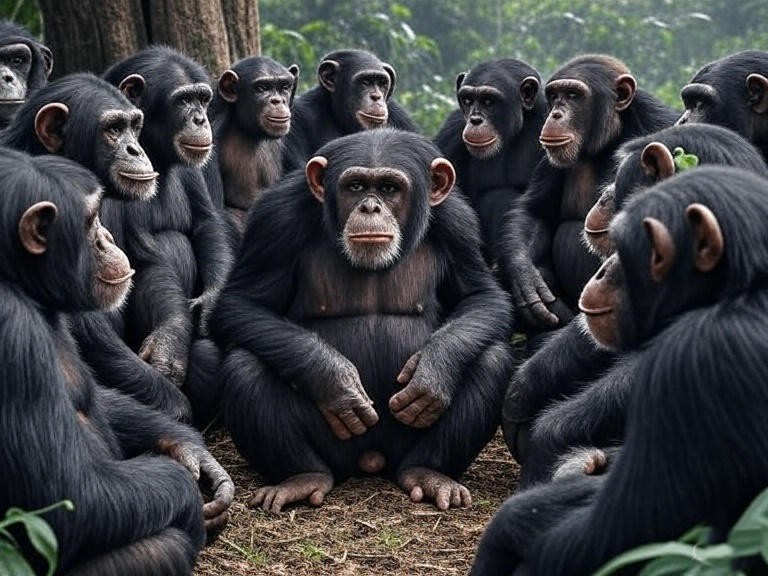Forget the marble halls and tailored suits for a moment. Step outside. Listen to the sunrise refrain not as birdsong, but as a complex community of alliances being affirmed, territories defended, and social bonds reinforced. Watch the chimpanzee troop grooming no longer just for parasites, but for political desire. Observe the elephant matriarch guiding her circle of relatives through drought, her decisions weighted with generations of discovered know-how and palpable empathy. The profound truth we’ve long resisted, wrapped in layers of human exceptionalism, is this: the difficult tapestry of human society—our power struggles, our deep loves, our nascent experience of proper and incorrect—isn’t always a uniquely human invention. It’s written inside the wild code, an ancient operating device going for walks long before we stood upright.
We look at the animal kingdom and often see instinct, simplicity, and a universal aspect. But peer closer, past the fur and feathers, and a startlingly familiar panorama emerges. The dramas playing out in forests, savannas, and oceans are not simply survival testimonies; they’re reflections of our very own innermost social impulses, revealing that politics, emotion, and even the seeds of ethics are evolutionary legacies, no longer divine sparks.

Power Plays: The Primate Roots of Politics
The chimpanzee alpha male doesn’t hold power solely through brute force. Like a seasoned politician, he builds coalitions. He grooms key allies, shares choice food strategically, and mediates disputes within the troop. He might even engage in complex “triadic” interactions—intervening in a fight between two others not to stop it, but to weaken a potential rival or strengthen a supporter. Sound familiar? It’s the essence of realpolitik: power is relational, built on alliances, favors, and the careful management of social debt.
Machiavelli in the Treetops: Frans de Waal’s groundbreaking work revealed chimp societies rife with manipulation, reconciliation, and calculated social climbing. Subordinates challenge alphas not through direct combat, but by slowly eroding their support base. Females form powerful matrilineal networks that can make or break a male’s reign. The parallels to human political maneuvering—the backroom deals, the shifting alliances, the importance of patronage—are undeniable. Power isn’t just seized; it’s negotiated within a complex social web.
Hierarchies and the “Quiet Managers”: Look beyond primates. Meerkat mobs have strict dominance hierarchies in which the alpha pair breeds; however, subordinates fiercely cooperate in doggy-rearing and sentinel duty, knowing their survival is tied to the institution’s fulfillment. Wolf packs, once rigidly dominated by an “alpha” pair, often exhibit characteristics greater like cooperative households led by experienced parents, guiding hunts and resolving conflicts. These aren’t senseless automatons obeying intuition; they are individuals navigating nuanced social systems, understanding their location, and contributing (or scheming) for that reason. It’s governance, wild-fashion.
The Tyranny and the Collective: Sometimes, the mirror is uncomfortable. Despotic male baboons ruling through fear and suppression, or the brutal infanticide committed by incoming lion prides to bring females back into estrus, reflect the dark potential of unchecked power—a potential tragically familiar in human history. Conversely, the near-egalitarian decision-making of African buffalo herds, where individuals vote on direction by pointing their bodies, hints at the deep roots of collective action.

The Heartbeat of the Herd: Emotions Laid Bare
The myth of the emotionless animal crumbles daily under scientific scrutiny. We see grief so profound it reshapes behavior: elephant families returning to the bones of a lost matriarch for years, touching them gently with their trunks, displaying signs of melancholy. Orca moms carry their lifeless calves for weeks throughout loads of miles, refusing to let go. Primates screaming in terror, whimpering in defeat, or embracing in jubilation.
Empathy’s Deep Roots: A rat, witnessing some other rat trapped in a field, will actively try to loosen it, even though the method of delaying getting rid of it is a delectable chocolate treat. Prairie voles shape lifelong pair bonds, displaying distress upon separation and comforting each other when careworn – neurochemically mirroring human attachment (oxytocin blanketed). Chimpanzees console the loser of a fight with hugs and grooming. This isn’t just sympathy; it’s empathy—the ability to perceive and share the emotional state of another. The neural circuitry for this fundamental social glue existed long before humans.
Jealousy, Shame, and the Social Mirror: A dog sulking after being scolded isn’t just reacting to the tone; studies suggest they understand the concept of “fairness” and react negatively to unequal treatment compared to another dog. Capuchin monkeys throw tantrums when a partner receives a better reward for the same task. Primates show off clear signs and symptoms of jealousy, shame, or even embarrassment when caught breaking social regulations. These complex social feelings, as soon as notions are uniquely human, are crucial for navigating organizational life, imposing norms, and maintaining brotherly love within the wild.
Joy, Play, and the Bonds That Bind: Watch dolphins surf waves, ravens slide down snowbanks, or young animals of infinite species interact in exuberant, apparently “pointless” play. This is not simply exercise for survival; it is natural pleasure, strengthening social bonds, lowering stress, and fostering cooperation. The laughter-like panting of gambling rats or the infectious pleasure of a dog with a stick reveals an emotional panorama a ways richer than mere stimulus-reaction.

The Seeds of Sanctuary: Where Does the Wild Code Become Ethics?
This is the most contentious, yet perhaps most profound, reflection. Do animals have “ethics”? Not inside the human experience of codified laws or summary philosophies. But do they show off the building blocks of moral conduct—reciprocity, fairness, cooperation, or even rudimentary principles of justice? Increasingly, the evidence says yes.
📌 Please Read Also – Wildlife Whisperers: Unlocking the Secrets of the Animal Kingdom
Reciprocity & Fairness: Vampire bats, who need blood food nightly to live on, will regurgitate blood to feed a hungry roost-mate who shared with them previously. Failure to reciprocate leads to ostracization. Cleaner fish meticulously carrier consumer fish, resisting the temptation to bite off a delectable mucus-blanketed scale (a quick-time period gain) due to the fact they recognize the long-term price of believe and repeat business—a form of mutualism underpinned by implicit policies. Experiments display that monkeys and dogs react strongly to unfair distributions of rewards, suggesting an innate, if fundamental, sense of equity.
Conflict Resolution & Reconciliation: Chimpanzees don’t simply combat; they actively reconcile. After conflicts, former warring parties have interactions, in particular gestures—kissing, embracing, and grooming—that reduce pressure and repair social bonds. This isn’t always random; it’s a critical mechanism for keeping institutional cohesion after inevitable disputes. Wolves carry out problematic reconciliation rituals after squabbles. Even some birds engage in post-conflict affiliative behaviors. The drive to repair relationships, to restore harmony, is a powerful force in social species.
Cooperation & Altruism: Meerkat sentinels risk their lives standing guard, gaining little immediate benefit while giving the group vital warning. Lionesses cooperatively hunt, sharing the kill, ensuring the survival of cubs that aren’t their own. Ant colonies function as superorganisms, with individuals sacrificing themselves for the colony’s good. While kin selection explains much altruism (helping those who share your genes), instances of seemingly altruistic behavior towards non-kin challenge simplistic explanations and hint at the deep evolutionary roots of cooperation as a survival strategy.

The Uncomfortable Mirror: What the Wild Code Tells Us About Ourselves
Seeing the chimp politician, the grieving elephant, and the bat practicing reciprocity forces a profound shift. It shatters the illusion of our separateness. Our complex societies, our turbulent emotions, our striving towards moral systems—these aren’t divine endowments dropped from the sky. They are elaborations, complexifications, of ancient social software.
We Are Not So Unique: Our capacity for Machiavellian strategy? Rooted in the coalition-building of our primate ancestors. Our deep empathy and capacity for grief? Shared with elephants, whales, and even rats. Our yearning for fairness? Mirrored in the reactions of dogs and capuchin monkeys. Recognizing this isn’t diminishing humanity; it’s grounding us in the broader, awe-inspiring story of life. We inherited the blueprint.
The Shadow Side: The mirror also reflects our capacity for cruelty, dominance, and tribalism. The brutal infighting, the xenophobia seen in chimp raids on neighboring troops, and the suppression within hierarchies—these dark potentials are also part of our wild heritage. Understanding their origins is the first step towards consciously choosing better.
A Call for Humility and Kinship: If baboons manipulate complex hierarchies, elephants grieve deeply, and bats practice reciprocal altruism, what does this say about our responsibility to them? It demands we pass beyond seeing them as mere sources or automatons. They are fellow travelers, sharing core aspects of our social and emotional reality. Their societies are not primitive versions of ours; they are parallel expressions of the same fundamental drive to connect, cooperate, and survive within a group.
📌 Please Read Also – The Unspoken Tragedy: Climate Change Grips Wildlife
The wild code isn’t just out there; it’s within us. Our boardrooms, our parliaments, our families, our moments of profound compassion or bitter conflict—they all hum with the echoes of ancient forests and savannas. By deciphering the politics of the troop, the emotions of the herd, and the nascent ethics of the colony, we don’t just learn about animals. We benefit from a deeper, humbler, and, in the end, greater related understanding of what it means to be human, now not other than nature, however profoundly, irrevocably, part of its ongoing, problematic, and deeply social experiment. The subsequent time you have a look at the social dance of animals, don’t forget: you are no longer just watching nature. You’re glimpsing the historical, shared roots of our very own tangled humanity.







+ There are no comments
Add yours